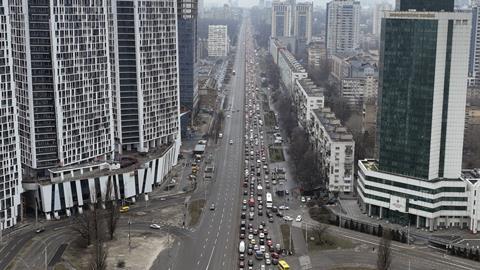Russia’s invasion of Ukraine has prompted furious reactions from bar associations both in the country and worldwide.
Condemning the action 'in the strongest terms', International Bar Association (IBA) president Sternford Moyo said: ‘This act by President Putin is a watershed moment that indisputably violates international law. Member states of the United Nations have, since 1945, agreed that territory should only change hands by consent. This rule is at the centre of maintaining international law and order between states.’
The IBA’s executive director, Mark Ellis, added: ‘International law is clear and absolute. A state is prohibited from the use or threat of force against another state. This is to ensure that the territorial integrity and political independence of the state are not violated. All instances of the use of force by one state against another, regardless of gravity or aims, constitute a violation. This protective principle is inviolable and one of the most fundamental norms of international law.
'There are only two main exceptions to this principle – the state is acting in self-defence or acting pursuant to a United Nations Security Council resolution. Neither of these two exceptions is applicable to Russia’s actions against Ukraine.'
Law Society of England and Wales president I. Stephanie Boyce said: 'We are gravely concerned by the news from Ukraine. A clear principle of international law is that a state is prohibited from the use or threat of force against another state. We hope for a swift end to hostilities and our thoughts are with all those affected.
'We are supporting and will continue to support our members in the region.'
Meanwhile a statement from the Ukrainian Bar Association (UBA) strongly condemned President Putin’s recognition 'of the so-called “Donetsk and Luhansk People’s Republics”.'
It continues: 'Once again, the Russian Federation has grossly violated the principles and norms of international law that guarantee the sovereignty, territorial integrity and independence of Ukraine and prohibit military aggression. Performance by the Russian armed forces of a “peacekeeping mission” in the territories occupied by Russia back in 2014 is yet another act of aggression which has been pre-planned and aims at a single goal of legalizing Russia’s military contingent in Ukraine and its further enlargement.'
Meanwhile law firms in England and Wales were reminded of the importance of their role in ensuring compliance with government-imposed sanctions.
The Solicitors Regulation Authority said that all SRA-regulated firms must have appropriate policies in place to ensure they comply with sanctions legislation, including undertaking regular and appropriate checks of sanctions lists.
The financial sanctions regime prevents law firms from doing business or acting for listed individuals, entities or ships. If an individual is on the sanctions list and subject to an asset freeze, firms may not deal with those funds or make resources available to that person. They must also make a report to the Office of Financial Sanctions Implementation (OFSI) if they suspect a customer of their firm is a designated person under the financial sanctions regime.
Law firms have responsibilities under the financial sanctions regime to safeguard the UK and protect the reputation of the legal services industry, the SRA said. Breaching the financial sanctions requirements can result in criminal prosecution or a fine.
Pictured above: Traffic jams are seen as people leave the city of Kyiv, Ukraine
This article is now closed for comment.
































10 Readers' comments